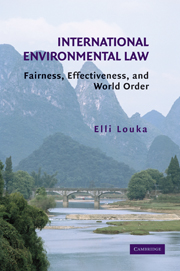Book contents
- Frontmatter
- Contents
- Foreword by W. Michael Reisman
- Abbreviations
- Introduction
- Chapter 1 Introduction to International Environmental Law
- Chapter 2 Foundations of International Environmental Law
- Chapter 3 Compliance and Governance Mechanisms
- Chapter 4 Marine Environment
- Chapter 5 Water Resources
- Chapter 6 Fisheries Resources
- Chapter 7 Biodiversity
- Chapter 8 Air Pollution
- Chapter 9 Trade and Environment
- Chapter 10 Hazardous and Radioactive Wastes
- Chapter 11 Liability and State Responsibility
- International Treaties and Other Instruments
- List of Cases
- Index
- Frontmatter
- Contents
- Foreword by W. Michael Reisman
- Abbreviations
- Introduction
- Chapter 1 Introduction to International Environmental Law
- Chapter 2 Foundations of International Environmental Law
- Chapter 3 Compliance and Governance Mechanisms
- Chapter 4 Marine Environment
- Chapter 5 Water Resources
- Chapter 6 Fisheries Resources
- Chapter 7 Biodiversity
- Chapter 8 Air Pollution
- Chapter 9 Trade and Environment
- Chapter 10 Hazardous and Radioactive Wastes
- Chapter 11 Liability and State Responsibility
- International Treaties and Other Instruments
- List of Cases
- Index
Summary
BIODIVERSITY MANAGEMENT
State of Biodiversity Resources
There is a general understanding that species are becoming extinct and that biodiversity is diminishing at an alarming rate primarily because of forest destruction as well as because of the disappearance of many other habitats, such as wetlands, and the pollution of seas and oceans. Because of the reported species loss and habitat destruction, measures have been taken, both in national and international arenas, to protect biodiversity.
How much biodiversity exists and how much is lost or diminishing every day is a subject of contention. For those who believe that all nature as it exists today must be preserved as is, biodiversity loss is acute, and every ecosystem conversion (e.g., the conversion of forests into agricultural lands) is identical to ecosystem destruction and, thus, extinction.
Other commentators, however, do not equate all habitat loss with species destruction. Most ecosystems, they point out, are not so fragile that any alteration will precipitate species loss. For instance, rainstorms, floods, fire, and other natural phenomena that are viewed, from a human perspective, as destructive are, in essence, part of ecosystem regulation. Human actions that affect the environment do not necessarily have to have adverse impacts. Shifting agriculture, for instance, practiced for years in tropical rainforests by indigenous peoples, has been viewed as constructive in ecosystem evolution.
When biodiversity is raised as an issue, the first image that comes to mind is the tropical rainforest.
- Type
- Chapter
- Information
- International Environmental LawFairness, Effectiveness, and World Order, pp. 288 - 342Publisher: Cambridge University PressPrint publication year: 2006



